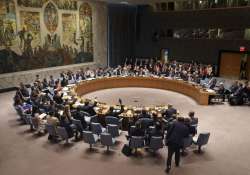UNSC blacklists 15 individuals, 4 entities linked to North Korean nuclear programme
However, China put its foot down to block tougher new sanctions against North Korea that the United States was pushing for.

The United Nations Security Council (UNSC) on Friday unanimously voted to blacklist 15 individuals and four entities linked to North Korea’s nuclear and missile programs.
However, China put its foot down to block tougher new sanctions against North Korea that the United States was pushing for.
While the UNSC resolution will impose a global travel ban and asset freeze on a range of North Koreans, including the man believed to head its overseas espionage operations and foreign intelligence collection, it will not target critical oil deliveries, a measure the Trump administration was seeking to step up pressure on Pyongyang.
In a tough speech after the vote, US Ambassador Nikki Haley said “the Security Council is sending a clear message to North Korea today: Stop firing ballistic missiles or face the consequences.”
While she said the United States wants a negotiated solution to the North’s nuclear program and isn’t seeking regime change, she reiterated that “all options for responding to future provocations remain on the table.” Haley urged all countries to break diplomatic ties with North Korea, stop illegal trade and do more to break up smuggling rings and cut off funding for the country’s nuclear and missile programs. “Beyond diplomatic and financial consequences, the United States remains prepared to counteract North Korean aggression through other means, if necessary,” she said.
By contrast, China’s U.N. Ambassador Liu Jieyi stressed that the resolution reiterated the importance of maintaining peace and security on the Korean Peninsula and northeast Asia and expressed the council’s commitment to a peaceful diplomatic and political solution, and to the importance of reducing tensions.
“The current situation on the peninsula is complex and sensitive,” he said. “At the same time, there is a critical window of opportunity for the nuclear issue of the peninsula to come back to the right path of seeking a settlement through dialogue and negotiations.”
Liu said China was calling on all parties to implement the resolution and “strive for a peaceful settlement of the nuclear issue” by strengthening efforts to denuclearize the Korean peninsula and promote peace and dialogue. He reiterated China’s proposal for North Korea to suspend its nuclear and missile activities in exchange for a suspension of massive military exercises by the United States and South Korea.
Before Friday’s vote, the North Korean sanctions blacklist named 39 individuals and 42 entities and groups subject to sanctions.
In addition to the foreign intelligence chief, the resolution imposes sanctions on officials who control the media and key government and military appointments. The Vietnam representative of a bank and the heads of two companies will also face sanctions. In addition, all countries are now required to freeze the assets of two trading companies, a bank and the Strategic Rocket Force of the Korean People’s Army, which is in charge of all ballistic missile programs.
The Security Council has already imposed six rounds of sanctions on North Korea, and the U.S. and its allies have pushed for tougher measures in response to a wave of missile tests by Pyongyang. But China’s Liu made clear last week that Beijing’s top priority is to restart talks with North Korea and reduce tensions, rather than impose new sanctions. The first individual on the proposed new blacklist is Cho Il U, identified as the director of the Fifth Bureau of the Reconnaissance General Bureau who is believed to be the overseas espionage and intelligence chief. Another key figure on the list is Kim Chol Nam, president of Korea Kumsan Trading Co., which procures supplies for North Korea’s atomic energy department and serves as “a cash route” to North Korea. The company would also be added to the sanctions list.
Others now facing sanctions include:
Kim Tong-Ho, Vietnam representative for Tanchon Commercial Bank, which is North Korea’s main “financial entity for weapons and missile-related sales.”
Pak Han Se, vice chairman of the government committee that oversees ballistic missile production and directs activities of Korea Mining Development Corp., the country’s “premier arms dealer and main exporter of goods and equipment related to ballistic missiles and conventional weapons.”
Ri Yong Mu, vice chairman of the State Affairs Commission, which directs and guide all military, defense and security-related affairs in the country, “including acquisitions and procurement.”
The resolution condemns North Korea’s nuclear and ballistic activities “in the strongest terms” and reaffirms the Security Council’s demand that Pyongyang abandon all nuclear weapons and programs and halt all nuclear and missile tests.
It expresses “serious concern” that North Korea continues to violate U.N. resolutions with repeated launches and attempted launches of ballistic missiles, stressing that these tests contribute to development of its nuclear weapons delivery systems.
It also expresses “gravest concern” that the North’s nuclear and missile activities are generating “increased tension in the region and beyond” and continue to threaten international peace and security.
(With AP inputs)